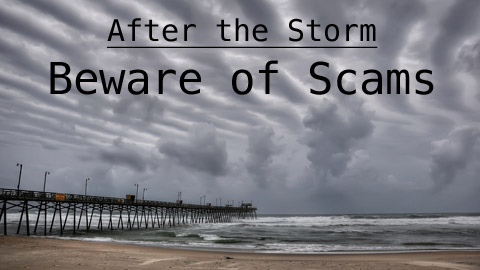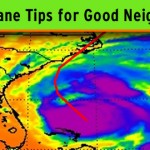After the Storm: Beware of Scams
Story by Leslie Huffman, photo of Bogue Inet Pier on Emerald Isle by Zach Frailey.
Cary, NC – Mercifully, we were spared in Cary from much of damage caused by Hurricane Irene. Was the storm over-hyped by the media? You wouldn’t think so if you lived in Dare County or New Bern. Has Irene veered 50 miles west, things could have have been much worse. As it was, tens of thousands of people lost power in Wake County.
Early warning, government preparedness and little luck spared us this time around. Now it’s time to weather the after-storm.
After the Storm, Hang Onto Your Wallet
Natural disasters can bring out the best in people. It can also bring out the worst.
Studies show a rise in certain types of scams following in the wake of hurricanes, tornadoes and earthquakes. These include price gouging, phony charities and home repair rip-offs.
Price Gouging
North Carolina’s Price Gouging Law is usually triggered when the state suffers a natural disaster such as a hurricane, tornado, winter storm, or flooding. Due to Irene, this law is currently in effect.
What is price gouging? It’s when businesses who offers goods and services needed in a time of crisis, raises prices and charges too much for that service or product. It is against North Carolina law when a disaster or emergency is declared or proclaimed by the Governor.
Under the law, the Attorney General’s Office can put a stop to price gouging and seek refunds for consumers who paid too much. The law applies to all levels of the supply chain from the manufacturer to the distributor to the retailer.
If you spot someone trying to make an unfair buck off of this disaster, report it to by filing a price gouging complaint online or calling 1-877-5-NO-SCAM.
Phony Charities
After a disaster you may find scammers who would use emergency circumstances to solicit donations in the name of a phony charity.
- First, always avoid giving cash.
- Second, ask for the charity’s name, address and telephone number, and whether or not your donation will be tax deductible.
A legitimate charity will mail you materials that tell you the charity’s mission and what your donation will help them do.
Also, a great rule is to only give to charities you know. The Red Cross, of course, is the best one when it comes to disaster relief efforts.
Vacationers Have Rights
Hurricane Irene is sure to interrupt vacation plans to the coast. If you rented property, you may have been offered insurance on your vacation rental. This would cover the cost of any nights you miss due to a mandatory evacuation.
If you’re ordered to evacuate and were not given a chance to purchase insurance, the landlord is required to refund your money for each night you can’t stay at the rental property due to the mandatory evacuation. But if you were offered rental insurance when you signed the rental agreement and you didn’t take it, then the owner is not required to refund your money.
For more information you can read North Carolina’s Vacation Rental Act, which protects consumers who rent a vacation property for fewer than 90 days.
Home Repair Rip-Offs
Watch out for these guys who may show up at your door after a storm. First, contact your insurance company. Some insurance companies require an adjuster’s approval before work can be done.
Never pay for repairs upfront, and seek out reputable contractors. You should also get three written estimates and compare bids.
Always check credentials and contact the Better Business Bureau to learn about any complaints against a contractor. Before work begins make sure you get a written contract that lists all the work to be performed, its costs and a completion date.
More Information
For more information and disaster tips, visit the North Carolina Attorney General’s office website. Or to report a scam to the Attorney General’s Consumer Protection Division, call 1-877-5-NO-SCAM.
Photo of Aquatic Rescue Team getting ready to move out from Salisbury to Wilmington on Saturday. Courtesy NC National Guard.





That is an extremely cool photo from Zach Frailey.